What is it?

This is the Royal Enfield Continental GT-R650 – the steed of racers competing in the new Continental GT Cup racing series. It’s a one-make championship newly introduced by Royal Enfield in India this year, in association with JK Tyre Motorsport and FMSCI. With this event, RE intends to introduce the Indian aspiring racers to retro racing that’s supposed to be raw and fun. Meanwhile, it also intends to showcase the track-abilities of its middle-weight café-racer, the Continental GT 650, after revising certain aspects of the bike.
To give us a first-hand experience of how the Continental GT-R650 performs on the race track, we were invited by Royal Enfield at the Kari Motor Speedway in Coimbatore where the first round of the GP Cup took place.
How different is it from stock bike?

As for the alterations that meet the eye, there's a typical retro-style bubble fairing at the front for improved aerodynamics. While it serves the purpose, it also makes the bike look truly gorgeous. The rear section of the frame is shorter and the ergonomics have also been changed by incorporating a lowered clip-on handlebar and footpegs that are more rearwards than the standard bike.

For improving its handling, RE has stiffened its suspension setup as well. While the front gets fork oil with a thicker viscosity, the rear springs are firmer than the standard units. Even the stock tyres have been replaced by soft compound race tyres supplied by JK. While the 650cc, parallel-twin engine has been left untouched, the inclusion of bespoke stainless steel exhaust has contributed to enhancing its performance by around 12 per cent, with a bump of around 4bhp. Lastly, thanks to all the weight-saving measures, the Continental GT-R650 is about 24kg lighter than the stock bike that weighs 202kg (kerb).
Out on the track

The first time I hopped on the bike, I was taken aback by how committed and focused riding stance it offers. If you think the stock GT is sporty, this is way more aggressive than that. You have to bend quite a bit to reach the handlebar, and then the rider footpegs are where pillion pegs sit on the production bike.
The ergonomics are undoubtedly aggressive, but all the discomfort fades away amidst the loud, roaring, and thrumming symphony it generates. It reverberated beautifully around the race track.

Once out on the track, the changes made in the bike started showing their effect instantaneously. The first major change that was quite pronounced was acceleration. It was noticeably quicker as compared to the stock bike. It was quite eager to reach its redline, owing to the revision in the final drive ratio. The front sprocket of the bike has 14 teeth instead of 15 in the stock bike. While this made the motorcycle peppier to exit out of the corners, it also meant I was hitting the rev limiter pretty early on the straights. That being said, this engine is quite forgiving due to the abundance of torque available across the rev range which means incorrect selection of gear around corners wasn’t a big problem.

Then the tweaked suspension setup also helped in inspiring confidence around the track, without feeling squishy and unstable. And given the bumpy track that the Kari Motor Speedway is, the undulations were soaked neatly, without disturbing the motorcycle. But the star of the show were the soft compound tyres by JK, wrapped around its 18-inch spoke wheels. These rubbers never made me feel nervous by delivering commendable grip and feedback.

Well, it was not all roses though. Despite the major weight reduction measures, the bike weighs about 178 kilograms, which is pretty heavy. I had to literally muscle and fight the bike to make it do the things I wanted it to do. At times, I couldn’t gauge its lazy responses properly and ended up running wide around certain corners. And the heft also affects the braking as you have to go really hard on them to stop in time. The feedback from the front brake lever isn’t very impressive either.
Conclusion

Well, it was fun! Of course, this was not the most agile and flickable bike I have ridden on the track. But if you understand the dynamics of the bike, give the bike its own sweet time to do its thing, it's highly rewarding. The most impressive aspects were the tyres which were super sticky and super grippy on the track. And the suspension works reasonably well even when you're really pushing the bike. Not to forget the engine, that’s already a dream even in its stock form. And with the aforementioned changes, it’s quicker and exciting.

The best part is, Royal Enfield says all the race-oriented changes can be achieved by shelling out around Rs1 lakh! I hope all the new Continental GT 650 buyers and existing owners are reading this.
Photography by Kapil Angane
Gallery
1/77
Fuel Tank
Double Tap to Zoom











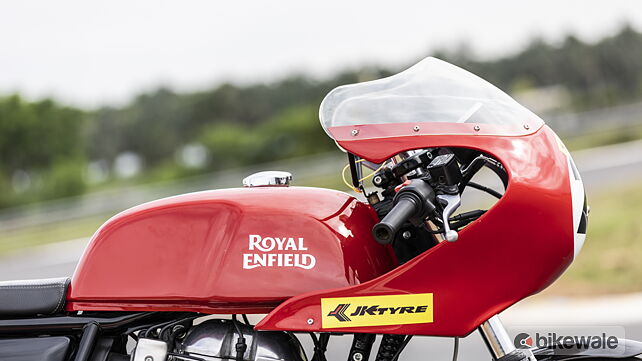












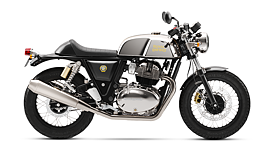
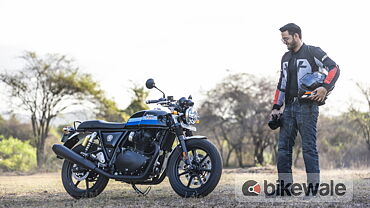




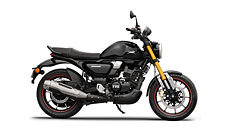
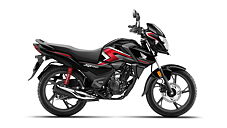
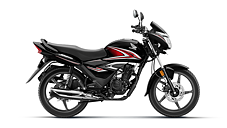

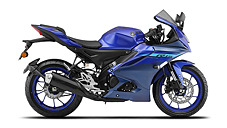
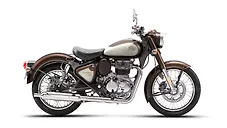
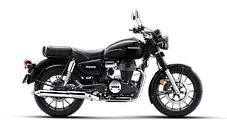
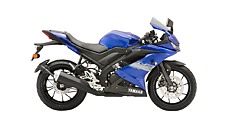
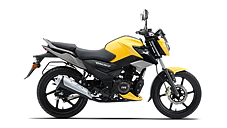
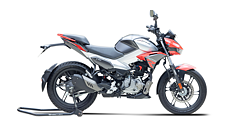
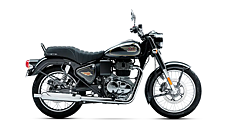

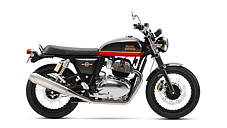
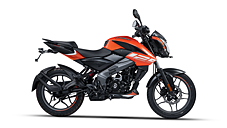






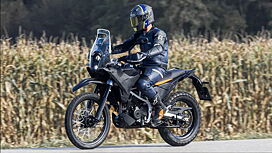
![KTM 390 Adventure X [2025] KTM 390 Adventure X [2025]](https://imgd.aeplcdn.com/272x153/n/cw/ec/190885/390-adventure-x-2025-right-side-view.jpeg?isig=0&q=80)